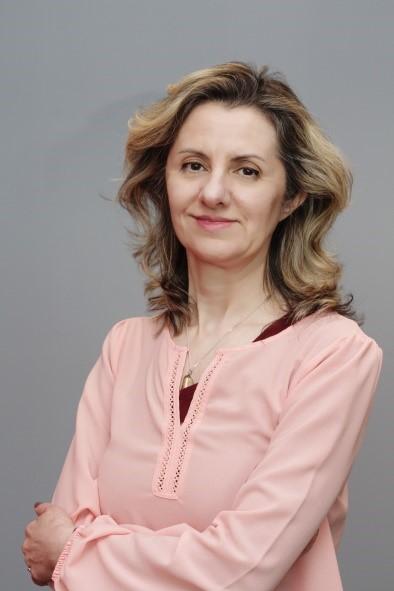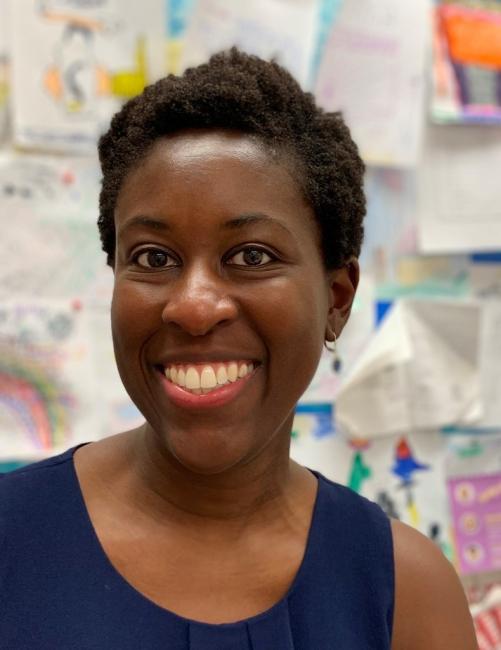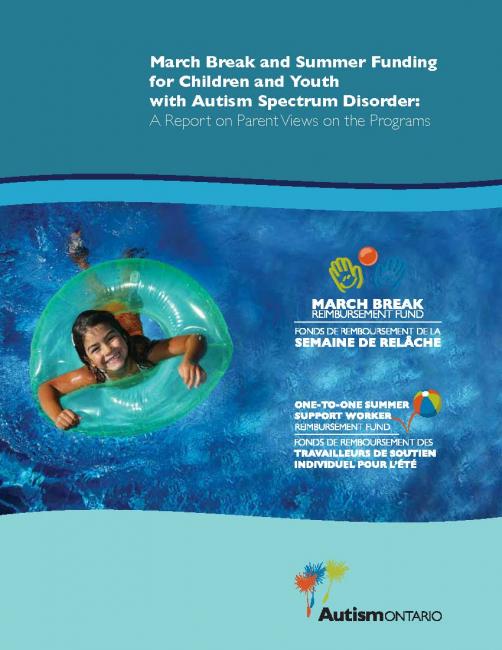Recherche
Légende
|
Accepte de nouveaux clients
|
N’accepte pas de nouveaux clients
|
|
Les services sont fournis en ligne
|
Se déplace dans les secteurs adjacents
|
|
Se déplace dans les secteurs éloignés
|
Clinicien(ne) réglementé(e) / agréé(e)
|
The CARES Program: Research, Development & Lived Experience
Your Comfort Zone - To Be In or Out of It: That is the Question
The Sensory Experience
Our environments are filled with sensory information. For some people with Autism Spectrum Disorder, this information can become over stimulating which can cause a sensory overload.
Watch these videos to help further understand sensory differences, and how to make an environment more inclusive for individuals on the autism spectrum.
L’expérience sensorielle
Nos environnements regorgent d’informations sensorielles. Pour certaines des personnes qui vivent avec un trouble du spectre de l’autisme, ces informations peuvent être hyperstimulantes et provoquer un débordement sensoriel.
Voici d’autres vidéos pour vous aider à mieux comprendre les différences sensorielles et à créer un environnement inclusif pour les personnes qui vivent un trouble du spectre de l’autisme.
45 Ideas for Classroom Friendly Fidget Toys
Kids who have trouble regulating sensory input can easily become distracted, seeking out sensation to either stimulate or calm their nervous system. Fidgeting gives them this input, usually in a way that is disruptive to both them and their classmates - wriggling, biting their nails, doodling, moving about the classroom.
A fidget toy is an object that the student can use to get this input in a less distracting way. They can help improve concentration and attention to tasks by allowing the brain to filter out the extra sensory information.
45 suggestions d'objets à triturer pour la salle de classe
Les enfants qui ont de la difficulté à réguler les stimuli sensoriels peuvent être
facilement distraits, à la recherche d’une sensation pour stimuler ou calmer leur
système nerveux. L’agitation leur procure cette sensation, habituellement d’une
manière qui les perturbe et perturbe aussi leurs camarades de classe – gigoter,
se ronger les ongles, se balancer, se promener dans la classe.
Un objet à triturer est un objet que l’élève peut utiliser pour se procurer cette
même sensation de façon moins distrayante pour lui et pour les autres. Ce
genre d’objet peut l’aider à améliorer sa concentration et à porter une plus
grande attention à ses tâches en permettant au cerveau de filtrer l’information
sensorielle supplémentaire.
Webinar - PEERS® - Science of Making Friends with Elizabeth Laugeson
Deficits in social skills are considered one of the defining challenges among youth with autism spectrum disorder (ASD), yet few evidence-based social skills programs exist for adolescents and young adults with ASD without intellectual disabilities. Using the techniques outlined in her book, The Science of Making Friends: Helping Socially Challenged Teens and Young Adults, Dr. Elizabeth Laugeson provides an overview of PEERS, her empirically supported social skills program for teens and young adults with ASD.
Speaker : Liz Laugeson
Dr. Elizabeth Laugeson is a licensed clinical psychologist and an Associate Clinical Professor in the Department of Psychiatry and Biobehavioral Sciences at the UCLA Semel Institute for Neuroscience and Human Behavior. Dr. Laugeson is the Founder and Director of the UCLA PEERS® Clinic, which is an outpatient hospital-based program providing parent-assisted social skills training for preschoolers, adolescents and young adults with Autism Spectrum Disorders and other social impairments. She also serves as the Training Director for the UCLA Tarjan Center for Excellence in Developmental Disabilities (UCEDD).
Dr. Laugeson has been a principal investigator and collaborator on a number of studies funded by the National Institutes of Health and Centers for Disease Control and Prevention investigating social skills training for youth with developmental disabilities from preschool to early adulthood and is the co-developer of an evidence-based social skills intervention for teens and young adults known as PEERS®. She was the two-time recipient of the Ruth L. Kirschstein National Research Service Award from the NIH from 2004-2007, recipient of the Semel Scholar Award for Junior Faculty Career Development in 2008, and received the Distinguished Alumnus Award from Pepperdine University in 2010. Dr. Laugeson has presented her research at international conferences throughout the world including the U.S., Canada, England, Italy, Australia, and Finland. Her groundbreaking work has been featured on national and international media outlets such as People Magazine, USA Today, the LA Times, New York Times, Washington Post, CBS, NBC, and Channel 4 in the United Kingdom.
Webinaire - PEERS® - La science de se faire des amis avec Elizabeth Laugeson
Le manque d’habiletés sociales est considéré comme un enjeu déterminant chez les jeunes qui vivent avec un trouble du spectre de l’autisme (TSA). Pourtant, il existe peu de programmes d’apprentissage des habiletés sociales basés sur des données probantes destinés aux adolescents et aux jeunes adultes autistes qui ne présentent pas de déficiences intellectuelles. En utilisant les techniques décrites dans son livre The Science of Making Friends: Helping Socially Challenged Teens and Young Adults, la psychologue Elizabeth Laugeson présente les grandes lignes du programme PEERS, un programme de développement des habiletés sociales qu’elle a élaboré en s’appuyant sur des données empiriques et qui s’adresse précisément aux enfants et aux jeunes adultes autistes.
Conférenciers : Liz Laugeson
Mme Elizabeth Laugeson, Ph.D., est psychologue clinicienne autorisée et professeure adjointe en clinique au Semel Institute for Neuroscience and Human Behavior, du département de psychiatrie et de sciences biocomportementales de l’Université de Californie à Los Angeles (UCLA). Elle est cofondatrice et directrice de la Clinique PEERS® de UCLA, un programme ambulatoire offert en milieu hospitalier qui propose, avec l’assistance des parents, des séances d’apprentissage des habiletés sociales aux enfants d’âge préscolaire, aux adolescents et des jeunes adultes ayant un trouble du spectre de l’autisme (TSA) ou d’autres déficiences sociales. Elle occupe également le poste de directrice de la formation au Tarjan Center for Excellence in Developmental Disabilities (UCEDD) de UCLA.
À titre de chercheure principale ou de collaboratrice, Mme Laugeson a participé à diverses études financées par les National Institutes of Health et les Centers for Disease Control and Prevention des États-Unis et portant sur l’apprentissage des habiletés sociales par les jeunes qui ont des troubles du développement, du préscolaire au début de l'âge adulte. Elle a également co-élaboré le programme PEERS®, un programme d’intervention sur les habiletés sociales fondé sur des données probantes qui s’adresse aux adolescents et aux jeunes adultes. Double lauréate du prix Ruth L.Kirschstein National Research Service des NIH entre 2004 et 2007, elle a également reçu le Semel Scholar Award for Junior Faculty Career Development en 2008 et le Distinguished Alumnus Award de l'Université Pepperdine en 2010. Mme Laugeson a présenté ses recherches dans des conférences internationales tenues un peu partout le monde, notamment aux États-Unis, au Canada, en Angleterre, en Italie, en Australie et en Finlande. En outre, divers médias nationaux et internationaux ont mis de l’avant ses travaux avant-gardistes, notamment le magazine People, USA Today, le L.A. Times, le New York Times, le Washington Post, CBS, NBC et Channel 4 au Royaume-Uni.
iPad Facts for Supporting Students with Autism & Other Exceptionalities
With the inception of the iPad and the surge of app development for children with Autism Spectrum Disorder (ASD), the iTunes “App” Store where iPad applications (typically referred to as “apps”), are purchased for classroom implementation can seem a little overwhelming at times! Nonetheless, the user-friendly nature of the tablet, its accessibility, and its relatively low costs have changed the way many learners with ASD can, for example, learn new skills, meet curricular expectations, utilize augmentative communication, and access required accommodations.
The following facts can help with building a strong entry level foundation of professional knowledge and skill to support students with ASD in your classroom through the use of iPad-based tablet technology.
Adult Assessment
Diagnostic chez l’adulte
Webinar - Equity-Based Health Promotion for Black Mothers of Children with Developmental Disabilities: Consideration for Practice and Policy during COVID-19 Pandemic and Beyond
What is an inclusive approach to health promotion? We will share the findings of a qualitative study of the challenges and strengths of black mothers of children with developmental disabilities. We will also discuss recommendations from the "approaches to care" section of the 2018 Canadian consensus guidelines on primary care for adults with Intellectual and Developmental Disabilities (IDD) and provide suggestions for improving diversity and inclusion within the places where we practice and receive care. We will conclude with recognizing the complexities of the COVID-19 pandemic for racialized families of children and youth with developmental disabilities.
Speakers:
Nazilla Khanlou, RN, PhD
Women’s Health Research Chair in Mental Health, Faculty of Health
Academic Lead, Lillian Wright Maternal Child Health Scholars Program
Associate Professor, School of Nursing York University
Nazilla Khanlou, RN, PhD is the Women’s Health Research Chair in Mental Health in the Faculty of Health at York University and an Associate Professor in its School of Nursing. She is the Academic Lead of the Lillian Meighen Wright Maternal-Child Health Scholars Program. Professor Khanlou’s clinical background is in psychiatric nursing. Her overall program of research is situated in the interdisciplinary field of community-based mental health promotion in general, and mental health promotion among youth and women in multicultural and immigrant-receiving settings in particular. She applies intersectionality-informed frameworks, using diverse research methods, in community-based research. She is founder of the International Network on Youth Integration (INYI), an international network for knowledge exchange and collaboration on youth. She has published articles, books, and reports on immigrant youth and women, and mental health.
Dr. Ullanda Niel is a Family Physician at the Scarborough Center for Healthy Communities in Toronto. She has a Bachelor of Science from Queen’s University and a Doctorate of Medicine from Albany Medical College in Albany, New York. She returned to Canada to complete a residency in Family Practice and a Fellowship in the Primary Care of Adults with Intellectual Disabilities at Queen’s University. She participated in creating The 2018 Canadian consensus guidelines on primary care for adults with Intellectual and Developmental Disabilities and clinical resources for the transition of youth with intellectual disabilities to adult care. Through her community health center, she cares for new immigrants, refugees and people with intellectual disabilities/autism including work at an in-school health clinic. She also works at Participation House, Markham, a group home for adults with cerebral palsy/intellectual disabilities.
Webinaire - Une promotion de la santé porteuse d’équité pour les mères de race noire d’enfants ayant des troubles du développement : Considérations sur les pratiques et les politiques pendant et après la pandémie de COVID-19 (en anglais)
Qu’est-ce qu’une approche inclusive de promotion de la santé? Nous présenterons les résultats d’une étude qualitative sur les difficultés et les points forts des mères de race noire d’enfants ayant des troubles du développement. Nous aborderons également les recommandations tirées de la section « Approches de soins » des Lignes directrices consensuelles canadiennes de 2018 sur les soins primaires aux adultes ayant une déficience intellectuelle ou développementale, et nous formulerons des suggestions sur la façon de promouvoir la diversité et l’inclusion dans les lieux de prestation et de réception des soins. Nous conclurons en reconnaissant la complexité des enjeux que présente la pandémie de COVID-19 pour les familles racisées d’enfants et d’adolescents ayant une déficience développementale.
Conférenciers :
Nazilla Khanlou, infirmière autorisée, Ph.D.
Chaire de recherche sur la santé mentale des femmes, Faculté de la santé
Directrice de la recherche, programme Lillian Meighen Wright de santé maternelle et infantile
Professeure agrégée, École de sciences infirmières de l’Université York
Nazilla Khanlou, IA, Ph.D., est titulaire de la Chaire de recherche sur la santé mentale des femmes à la Faculté de la santé de l’Université York, et professeure agrégée à l’École des sciences infirmières de l’Université. Elle est également directrice de la recherche du programme Lillian Meighen Wright de santé maternelle et infantile. Son expérience clinique porte sur les soins infirmiers et psychiatriques. Ses intérêts de recherche visent le domaine interdisciplinaire de la promotion de la santé mentale communautaire en général, et plus précisément la promotion de la santé mentale chez les jeunes et les femmes des milieux multiculturels et d’accueil des immigrants. Elle base ses recherches communautaires sur des cadres d’analyse fondés sur l’intersectionnalité, en appliquant diverses méthodes de recherche. Fondatrice de l’International Network on Youth Integration (INYI), un réseau international de collaboration et d’échange de savoir sur les jeunes, elle a publié des articles, des ouvrages et des rapports sur les femmes et les jeunes immigrants et la santé mentale.
Dre Ullanda Niel est médecin de famille au Scarborough Centre for Healthy Communities à Toronto. Elle détient un baccalauréat en sciences de l’Université Queen’s et un doctorat en médecine du Albany Medical College à Albany, dans l’État de New York. Elle est retournée au Canada pour effectuer un internat en médecine familiale et un stage de recherche en soins primaires pour adultes ayant une déficience intellectuelle à l’Université Queen’s. Elle a participé à l’élaboration des Lignes directrices consensuelles canadiennes de 2018 sur les soins primaires aux adultes ayant une déficience intellectuelle ou développementale et à la création de ressources cliniques pour la transition vers les soins aux adultes des adolescents ayant une déficience intellectuelle. Par l’entremise de son centre de santé communautaire, elle s’occupe des nouveaux immigrants, des réfugiés et des autres personnes ayant une déficience intellectuelle ou un diagnostic d’autisme, notamment par son travail dans une clinique de santé scolaire. Elle œuvre également à Participation House, un foyer de groupe pour adultes ayant une paralysie cérébrale/déficience intellectuelle, dans la ville de Markham.
Meghan's Art
Celebrate World Autism Day with us on April 6th!
Célébrez avec nous la Journée mondiale de l’autisme, le 6 avril!
What Autism Means to Us - World Autism Day 2021
Ce que l’autisme signifie pour nous - Journée mondiale de l’autisme 2021
Autistic Adults Review The Good Doctor
Autism Career Connections
Webinar - How Can I Help my Child to Print? Part 3: Making Sense of Line and Spacing with Taunia Clouthier
Part 3 of 4: This webinar will highlight the organization of print onto lined paper. Several types of paper will be reviewed to help better understand what one may best suit a child's needs. Tips and tricks to work on spacing will also be discussed.
Other sessions in this series:
Part 1 of 4: A Printing Readiness Workshop for Parents
Part 2 of 4: Lower Case Letters
Part 4 of 4: Building a Foundation
Speaker: Taunia Clouthier
Taunia Clouthier is an Occupational Therapist who brings 10 years of experience working within the School Health Support OT Services, where she assumes a consultative role in supporting children, parents and staff within the school environment. The skills and knowledge that she has gained over the years has inspired her to create FUNctional Therapy in 2018, a company in which she can further share her knowledge and passions through direct services and workshops. She is very passionate about providing education and believes it is one of the keys to successful growth and development in children.
Webinaire - Comment puis-je aider mon enfant à écrire? Prtie 3: Comprendre les lignes et les espaces avec Taunia Clouthier (en anglais)
Partie 3 sur 4: Ce webinaire porte sur l’organisation de l’écriture sur du papier ligné. Nous passerons en revue plusieurs types de papier, pour comprendre lequel peut le mieux correspondre aux besoins d’un enfant. Nous présenterons également des conseils et des astuces sur l’espacement de l’écriture.
Sessions supplémentaires dans cette série de webinaires:
Partie 1 sur 4: Un atelier de préparation à l’enseignement de l’écriture pour les parents
Partie 2 sur 4: Les lettres minuscules
Partie 4 sur 4: Jeter les bases
Conférenciers: Taunia Clouthier
Taunia Clouthier est une ergothérapeute œuvrant pendant dix ans avec les Services auxiliaires de santé dans les écoles de l’Ontario, où elle joue un rôle consultatif auprès des enfants, des parents et du personnel en milieu scolaire. Les connaissances et les compétences qu’elle a acquises au cours de ces années l’ont inspirée à créer FUNctional Therapy en 2018. Il s’agit d’une entreprise avec laquelle elle peut partager son savoir et ses passions dans le cadre de services et d’ateliers directs. Taunia est une personne extrêmement passionnée par le partage de connaissances, et elle croit que c’est l’une des clés d’une croissance d’un développement réussis chez les enfants.
Webinar - How Can I Help My Child to Print?: Part 4: Building a Foundation with Taunia Clouthier
Part 4 of 4: This webinar will highlight how to develop an understanding of what activities to implement to encourage successful fine motor development and upper extremity strengthening in children.
Other sessions in this series:
Part 1 of 4: A Printing Readiness Workshop for Parents
Part 2 of 4: Lower Case Letters
Part 3 of 4: Making Sense of Lines and Spacing
Speaker: Taunia Clouthier
Taunia Clouthier is an Occupational Therapist who brings 10 years of experience working within the School Health Support OT Services, where she assumes a consultative role in supporting children, parents and staff within the school environment. The skills and knowledge that she has gained over the years has inspired her to create FUNctional Therapy in 2018, a company in which she can further share her knowledge and passions through direct services and workshops. She is very passionate about providing education and believes it is one of the keys to successful growth and development in children.
Webinaire - Comment puis-je aider mon enfant à écrire? Partie 4 : Jeter les bases avec Taunia Clouthier (en anglais)
Partie 4 sur 4: Ce webinaire vous expliquera comment déterminer quelles activités contribuent à encourager le développement de la motricité fine et le renforcement des membres supérieurs chez les enfants.
Sessions supplémentaires dans cette série de webinaires:
Partie 1 sur 4: Un atelier de préparation à l’enseignement de l’écriture pour les parents
Partie 2 sur 4: Les lettres minuscules
Partie 3 sur 4: Comprendre les lignes et les espaces
Conférenciers: Taunia Clouthier
Taunia Clouthier est une ergothérapeute œuvrant pendant dix ans avec les Services auxiliaires de santé dans les écoles de l’Ontario, où elle joue un rôle consultatif auprès des enfants, des parents et du personnel en milieu scolaire. Les connaissances et les compétences qu’elle a acquises au cours de ces années l’ont inspirée à créer FUNctional Therapy en 2018. Il s’agit d’une entreprise avec laquelle elle peut partager son savoir et ses passions dans le cadre de services et d’ateliers directs. Taunia est une personne extrêmement passionnée par le partage de connaissances, et elle croit que c’est l’une des clés d’une croissance d’un développement réussis chez les enfants.
Young Adults with Developmental Disabilities: Barriers to Employment
This research summary focuses on how young people with developmental disabilities (DDs), like all young people, experience exciting opportunities as they move from adolescence to the demands of adulthood. Becoming an adult for the young person with a developmental disability entails exploring new interests, getting to know their community and new service workers, learning work skills and making new friends. Yet, young adults with DDs and their families experience many more challenges and barriers to achieve their goals than families of children with no disabilities.
Les obstacles à l’emploi des jeunes adultes ayant un handicap de développement
Ce sommaire de recherche porte sur la façon dont les autres jeunes, le passage de l’adolescence aux rigueurs de l’âge adulte ouvre de passionnants horizons aux jeunes individus ayant un handicap de développement (HD), qui peuvent alors explorer de nouveaux intérêts, faire connaissance avec de nouveaux aidants et intervenants communautaires, acquérir des compétences professionnelles et nouer de nouvelles amitiés. Cependant, les jeunes adultes ayant un HD, de même que leurs familles, rencontrent beaucoup plus de problèmes et d’obstacles dans l’atteinte de leurs objectifs que les familles d’enfants non handicapés.
Young Adults with Developmental Disabilities & Inclusive Research: Why does it matter?
This research summary focuses on how people with developmental disabilities (DDs) live in conditions of socioeconomic disadvantage. They experience inequality because they have fewer opportunities to achieve education and employment opportunities. They are also excluded because of stigma, and face obstacles to fully participate in their communities. In Canada people with disabilities between 15 and 64 years old have an employment rate of about 22%, the rate for people without disabilities is more than 73% (Statistics Canada, 2015). Discrimination, exclusion and stigma significantly impact on people with disabilities’ mental health and wellbeing.
Jeunes adultes avec un handicap de développement et inclusivité de la recherche : pourquoi est-ce important?
Ce sommaire de recherche porte sur la façon dont les jeunes personnes ayant un trouble du développement (TD) composent avec une situation de défavorisation socioéconomique.. Leurs moindres possibilités de scolarisation et d’emploi sont cause d’inégalité. La stigmatisation est une autre cause d’exclusion pour ces personnes, dont la pleine participation à la vie communautaire se heurte à des obstacles. Au Canada, les personnes handicapées de 15 à 64 ans présentent un taux d’emploi d’environ 22 %, contre plus de 73 % pour les personnes non handicapées (Statistique Canada, 2015). La discrimination, l’exclusion et la stigmatisation nuisent considérablement à la santé mentale et au bien-être des personnes handicapées.
2012 March Break and Summer Funding for Children and Youth with Autism Spectrum Disorder: A Report on Parent Views on the Programs
This report was published in 2012.
For over 35 years, Autism Ontario has worked with the Government of Ontario towards a vision of “acceptance and opportunities for all individuals with ASD”. One initiative of Autism Ontario was to develop a program that would provide direct financial support to families of children with Autism Spectrum Disorders (ASD) to enable them to participate in community-based activities/programs throughout the Summer and March Break vacations from school, such as camps and recreational programs. Financial support for Summer funding was first provided by the Ministry of Children and Youth Services in 2007. Funding could be used by families in a variety of ways. The funding could be used by families to pay for
community recreational/camps programs or one-to-one support over March Break or one-to-one support
during summer holidays.
The direct goals of this program were: (1) to provide families with respite; (2) to support community and recreational participation of children with ASD; (3) to provide high-quality programing opportunities; and (4) to help provide continuity of care during vacation periods defined by the school calendar. Through these four primary goals, it was hoped that several secondary objectives may be achieved: (1) lower parental stress; (2) improvement in skills of the children; and (3) modest improvement in ASD symptomatology. An evaluation component of the program was initiated by Autism Ontario to measure the effective and ineffective elements of the program. This paper will provide an overview of the process involved in the
evaluation of the March Break and Summer Funding program, along with a review of the results of the evaluation. First, a very brief overview of some research supporting the importance of the identified program goals will be reviewed. Next, the evaluation process will be described, followed by a review of the results from the program evaluation. Finally, an executive summary will provide a concise overview of key messages of this evaluation.








